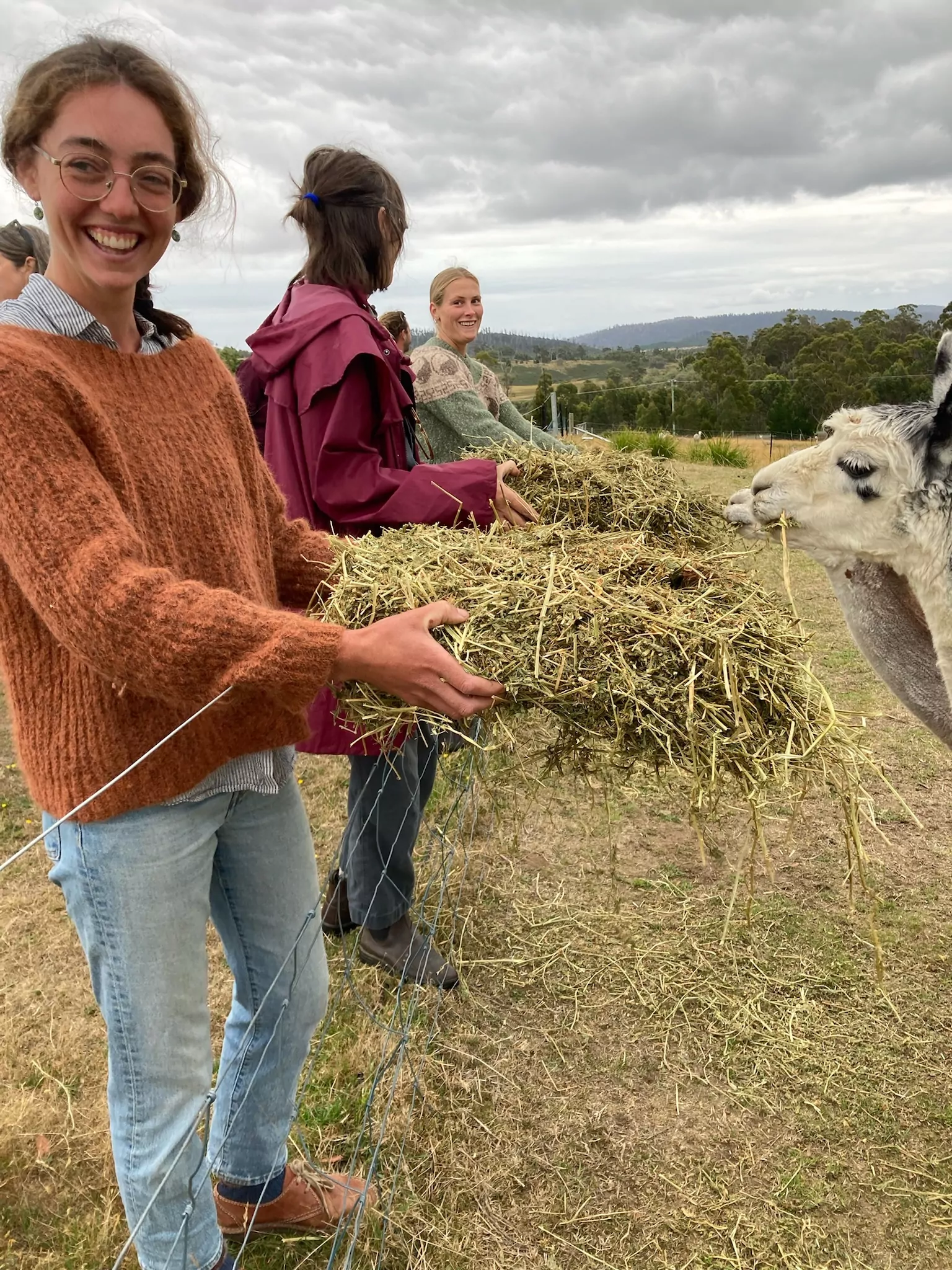The Dirt – February 2024
Welcome to the February 2024 edition of our monthly newsletter, The Dirt, where we dish the dirt on the latest comings and goings of Sprout Tasmania.
in our paddock
The Sprout Producer Program
And we’re off! Just over a week ago we held our first field day for the year, and despite the drizzle and cooler temperatures we had an absolute blast.
The day started at Rise & Shine Farm in Copping, home to Coral and Nick Warren. We heard all about their journey into farming, how they’ve tried certain enterprises, dropped some, expanded others, and their experience of being part of the SPP in 2022. We then had a tour of the market garden and met the alpacas, learning why they remain an important part of their business.
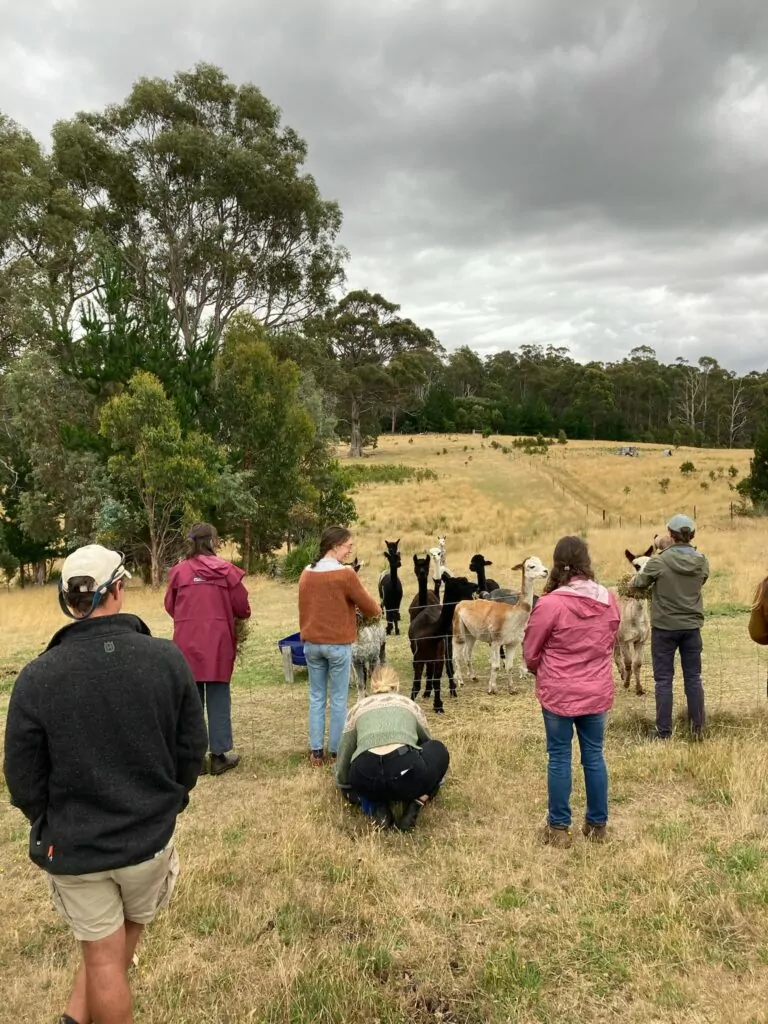
From there we drove up the road to Leap Farm, where we were greeted by Iain and Kate Field. Iain and Kate run goats for dairy and meat, as well as a beef herd. They also make cheese on-farm under their Tongola Cheese brand, and we started the tour with a chat in the milking shed hearing how the couple came to be goat farmers and cheese makers.
Iain and Kate don’t do things by halves. We learnt how they found the sweet spot to run an efficient dairy, and how they calculated their carbon emissions and determined their carbon sequestration rate. You can learn more about this on their website.
After a quick demo on the milking platform from Kate and Iain’s 2-legged kids, we went outside for some goat time, and a quick tour of the paddocks.
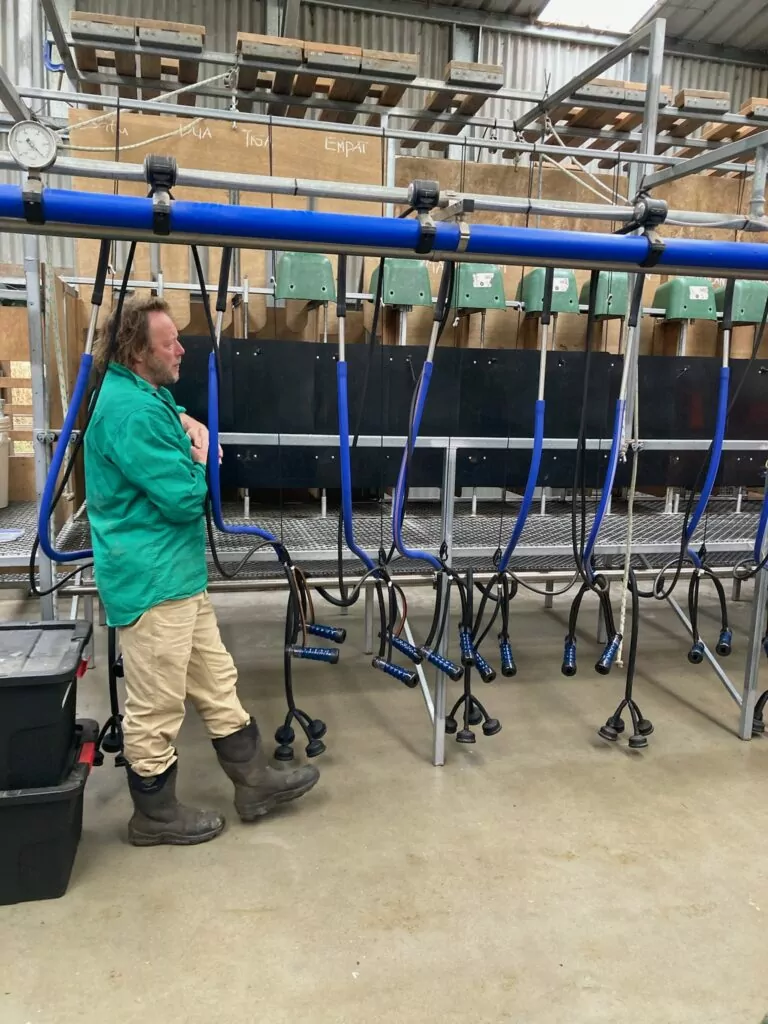
The last farm of the day was to the first of this year’s SPP participants. Andy Walton.
Bryn Gwyn is a 55-acre farm that was historically used to graze sheep but hasn’t been actively managed for decades.
As we sat around, Andy explained how this is about to change, and how he plans to start a farm that will be as interesting as it is diverse. His plans include a vineyard and we had the privilege of having Tony Scherer on hand to offer some pearls of wisdom. Andy is one to watch, and it was a real pleasure to visit his farm and to begin getting to know him.
SPP 2024 producer feature – Appinoka Regenerative Farming
Situated in the beautiful Mountain River, at the foot of Sleeping Beauty, is Appinoka Regenerative Farming, where lots of change has been happening.
Thomas and Nanette Botha have lived in countries where food is produced for the masses. “Fresh produce” often tasted like nothing and you couldn’t really blame children for not wanting to eat it. Their vision is to produce food that they (and their children) love to eat and to share it with those who want the same for their families. At the same time they continue to make conscious decisions to apply lean practices to their farm that will enable them to excel in farming practices, be more efficient, eliminate waste and produce good growth.
When they bought the land in 2019, not much was growing – there was no diversity, some areas were waterlogged while others were bone dry and there was no infrastructure. Their dream of not only repairing the soil, but starting to regenerate it, has kept them going ever since. It has been a steep learning curve (and continues to be), but the changes that they are seeing on the farm have exceeded their wildest expectations! They now have 5 dairy cows, sheep, laying hens, meat chickens and pigs on rotational grazing as well as a market garden and 8000 strawberry plants in production! Their aim with every new addition to the farm is to produce for ourselves first – when they are satisfied with the quality, they start sharing with the community. They currently provide produce to our local community and two local restaurants.
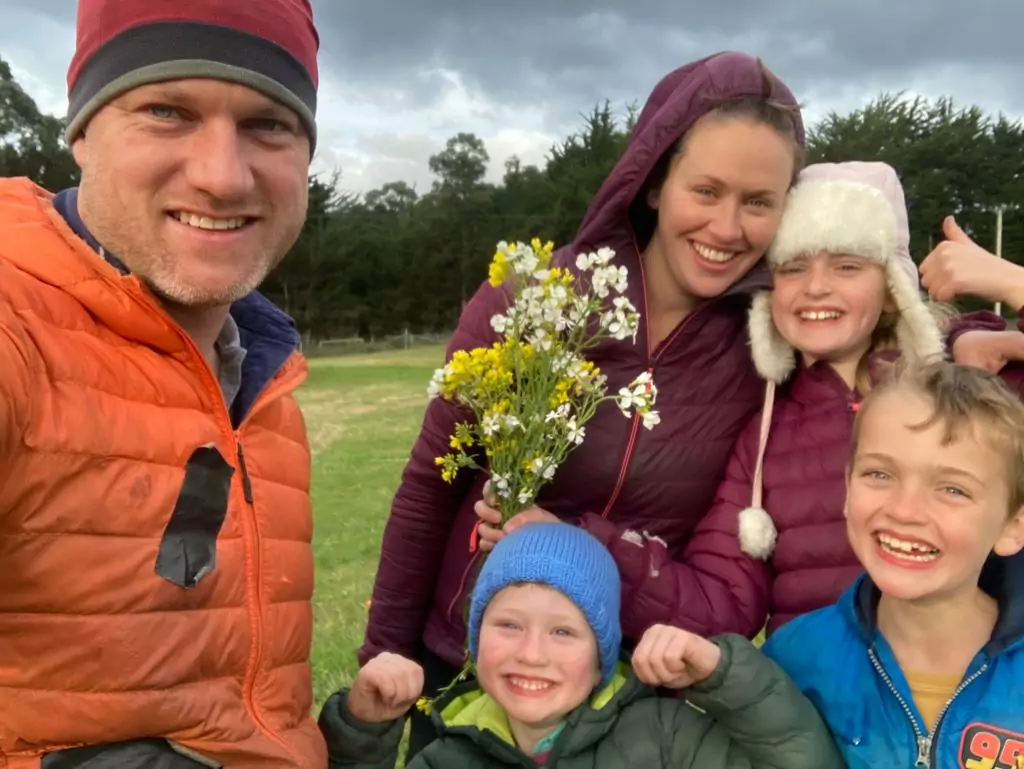
You can find details of all this year’s participants here.
And information on all the SPP alumni here.
Membership and donating
One of the aspects we are working on is a membership restructure. We’re currently looking at who are members are, the benefits we offer members, and we are also designing an auto-renewal system.
What we do know is that there are Sprout supporters who prefer to support us without needing to join as a member. Perhaps they’re outside of Tasmania and can’t take advantage of discounted event tickets, or maybe they don’t farm and don’t require representation.
Whatever the reason, if you feel you don’t want to be a member of Sprout but would still like to support us, we do offer a an option to provide a monthly donation. Donating to Sprout will help ensure we can continue to support and advocate for the small scale producer sector in Tasmania.
Here are some examples of how your money will play a part in enabling us to support small scale farmers in Tasmania.
- $50 gives us the systems we need to host online hangout sessions with members to keep networks and connections fresh.
- $250 means we can hire a consultant to present to our Sprout Producer Program Scholarship cohort, to share their knowledge.
- $500 gives us the capability to travel to advocacy meetings statewide to speak with local and state government departments.
- $1,000 means we can provide online and physical workshops for our members to further their skills and capacity;
- $5,000 provides one full, 12 month scholarship for a farmer as part of the Sprout Producer Program.
Strategy sessions
We’ve been using the summer to work on our strategic and operational planning. It’s been fun, energising, and with 2024 shaping up to be a big one for Sprout it’s been so timely.
The first session was held with the board. Most board meetings are held online these days, so to all be together was a reminder of how productive in-person meetings are, and how valuable it is to find time for them. A huge thank you to all our board members for such a great day!
The second session was with the wonderful, funny, and articulate Bonnie Tuttle. Having some external assistance with our strategy is crucial, and there’s no one we’d rather be working with. We look forward to sharing what our reshaped vision and mission will be once we’re done!
Your Community
Introduction to Natural Sequence Farming
Tarwyn Park Training are once again heading to Ripple Farm in Richmond for a one day workshop. The event will provide an introduction to NSF, helping you understand how landscape functions and what NSF can do to help soil health, biodiversity and water retention. You will also get to see what changes it’s made to Ripple Farm. Tickets are $100 and can be purchased here.
Foundations of Holistic Management Course
The first of 6 online webinars begin today with HM Educator Barb Howard. Participants will be supported through the Savory Foundations of Holistic Management Course Bundle – a self-paced, five-module online course that covers introductory principles of Holistic Management, ecosystem processes, tools, decision making, and monitoring decisions. The course introduces a brief overview of Holistic Planned Grazing (HPG), Holistic Financial Planning (HFP), and Holistic Land Planning (HLP) but does not go into these planning processes.
Small Business Walking The Talk Workshop
Helen Ransom from SSC (Sky, Sea, Country) will be running two on Country (weather permitting) workshops for small business owners and employees in February 2024. Each workshop will be capped at 12 participants, and she is offering small businesses a highly discounted rate of $120 per person.
Learn the foundations of creating a bespoke Acknowledgement of Country to reflect your business values and your connection to Aboriginal Tasmania. I (Ollie) was lucky enough to do this workshop last summer, and I highly recommend it.
When: Friday 16 and Saturday 17 Feb 2024 1pm – 4pm
Where: SheOak Point, Rosny (next to Rosny Bowls Club)
Broom & Brine’s Seasonal Zine
I’ve been meaning to plug Grace and Dylan’s zine for ages. For those that haven’t come across it, they always make wonderful reading. The last one published was the Sept/Oct/Nov ’23 edition, so I’m late in promoting it, but you could argue I’m just early in promoting the end of summer one!
Wolki Farm’s blog
After you’ve read Grace and Dylan’s zine, have a little squizz at Jake Wolki’s blog.
Obviously they are poles apart, and each have different interpretations on farming and scaling, but can you support both views? I believe so. Strong food systems require a diversity of farming enterprises, scales, crops and animals.
We also believe it has to include the highest animal welfare standards throughout the supply chain, and food has to come from farms that improve landscape function and that support the communities in which they are located.
I love Jake’s energy, his readiness to challenge the status quo, and his desire to see regenerative ag make a dent in the market and be affordable.
Tamar Irrigation Scheme
Tasmanian Irrigation recently announced it will coordinate four Drop in Day sessions, enabling farmers to learn more about the project, ask questions, meet the Tamar team and seek assistance with application forms.
The next session will be on February 20, details are below.
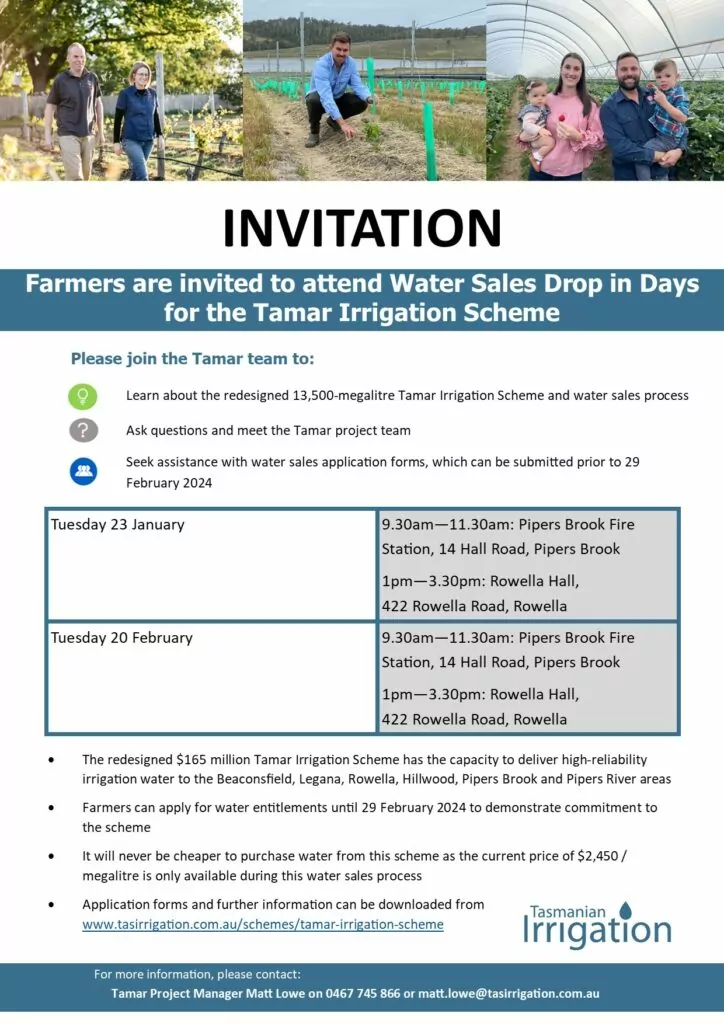
Sheep and goat eID
As reported recently by TasFarmers (formerly TFGA), Tasmania’s state government has announced $11.6 million in funding to assist sheep and goat producers in implementing eID tags in preparation for the mandatory nationwide eID roll-out from 1 January 2025.
The funding package aims to enhance supply chain infrastructure and offer discounts on tags for livestock producers. It includes:
- Rebates of up to 75% of costs for eID scanning infrastructure for eligible supply chain participants (processors, saleyards, transit yards).
- Rebates of up to 100% of costs for eID scanning equipment for eligible agricultural societies and not-for-profit groups.
- Rebates of up to 100% of costs for handheld eID scanning devices for eligible producers.
- Producers will also be eligible for a rebate of $1 per eID ear tag and $4 per eID goat leg band.
The infrastructure funding will be obtained through a grant scheme, with a rebate applied at the point of sale for tags. For more details on the eID tags see the NRE website.
Farm Household Allowance – Eligibility changes
The Australian Government have announced proposed changes from 1 July 2024 for the Farm Household Allowance (FHA), that includes introducing a minimum gross annual turn over of $60,000 to limit access to FHA to commercial scale farms with reasonable prospects of financial viability, among other changes.
For full details of this proposal and what they changes might mean for you head here.
Farmer’s Footprint – Regenerating Our Backyard
We love seeing what other like-minded organisations across the country are up to.
This short film about the Young Farmer Incubator program set up by Farmer’s Footprint and The Farm at Byron Bay is a great example of collaboration and grassroots action.
further reading
Did you see the recent article in the Guardian discussing the study that found a move to sustainable food systems could bring $10tn benefits a year?
The study, produced by a number of authors including the Food System Economics Commission, which has been formed by the Potsdam Institute, proposes a shift of subsidies and tax incentives away from large-scale monocultures that rely on fertilisers, pesticides and forest clearance, instead directing them towards smallholders who could turn farms into carbon sinks with more space for wildlife. It was also welcomed by Nicholas Stern, the chair of the Grantham Research Institute on Climate Change and the Environment at the London School of Economics, who said:
“The economics of today’s food system are, sadly, broken beyond repair. Its so-called ‘hidden costs’ are harming our health and degrading our planet, while also worsening global inequalities. Changing the ways we produce and consume food will be critical to tackling climate change, protecting biodiversity, and building a better future. It is time for radical change.”
We couldn’t agree more with this statement, although the study and article do seem to leave out the fundamental role agroecology could and should play.
I (Ollie) also spotted this article in the UK edition of The Guardian recently about a British farming consultant called Heather Wildman who “describes herself as a succession facilitator – a role combining professional consultancy, financial advice, legal mediation, succession planning and life coaching to people working in agriculture: a farm-business counsellor, if you like”. It’s well worth a read over your morning tea.
It got me thinking, does something similar need to exist in Tasmania? Is anyone providing this, or do people feel Sprout already cross over into this work? At a time when I’m pondering our capacity to assist producers on a one-to-one level, do we have the ability to offer this level of work?
As always, we love hearing from you, so please drop us an email, contact us via our socials, or even give us a call if you have any views on this, or anything else mentioned in this month’s newsletter.
We hope you enjoy the summer season, see you again at the start of February.
Thanks as always,
Jen and Ollie
